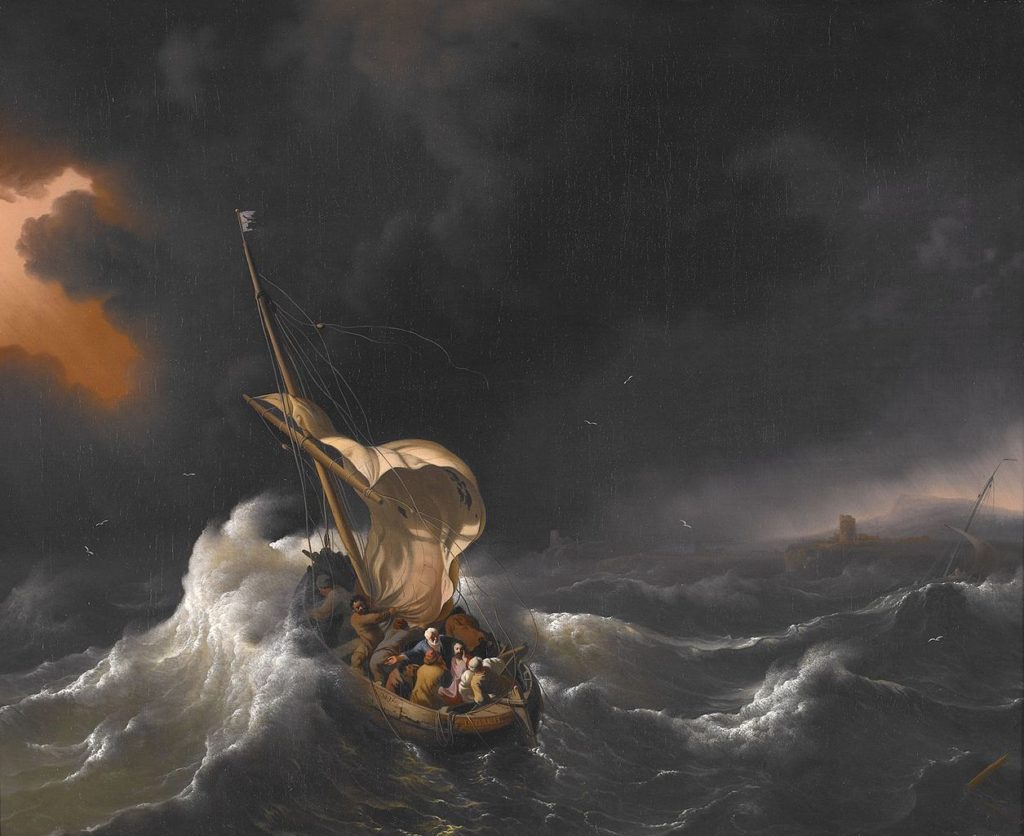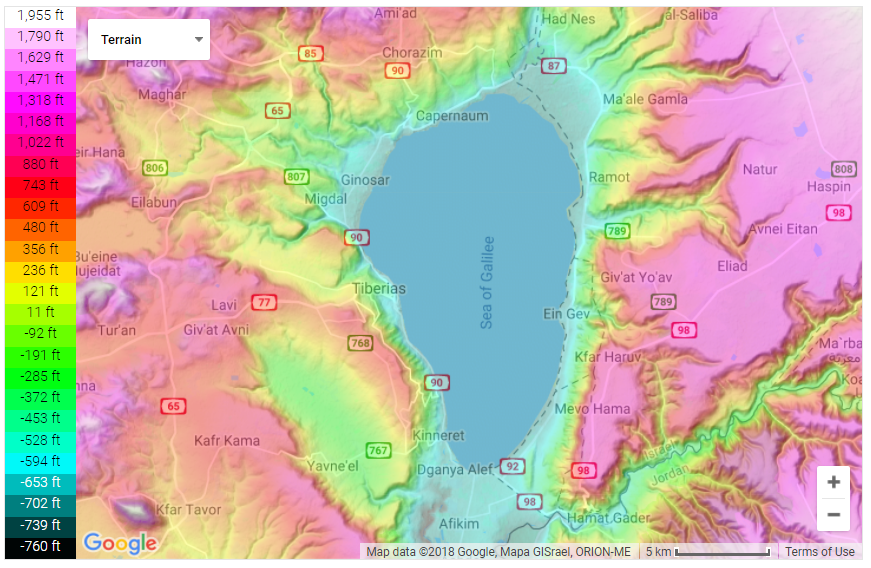Scripture Readings: 1 Sam. 17:32-49; Ps. 9:9-20; 2 Cor. 6:1-13; Mark 4:35-41 Sermon by Linda Rex from Mark 4:35-41
Trusting God in the Storms
Introduction
Fear is a powerful force. At a basic level we respond by fighting or fleeing. When we encounter someone we view as unsafe, we typically respond in fear, resisting being in relationship with them. Unfortunately, that’s how some people respond to God.
We humans often see ourselves as all alone in the world. Perhaps in times of trouble in the past we depended on others, only to be let down, even betrayed. Based on that experience, we view ourselves as our only savior. But that’s a big problem, for many of the things we face in life are beyond our capacity to handle. We cannot save ourselves. In his Gospel, Mark tells a story about Jesus and his disciples that speaks to this issue:
When evening came, [Jesus] said to his disciples, “Let us go over to the other side.” Leaving the crowd behind, they took him along, just as he was, in the boat. There were also other boats with him…
There the disciples were —with Jesus in the boat crossing the sea of Galilee. They likely felt safe and secure in the Master’s presence. But then it happened:
…A furious squall came up, and the waves broke over the boat, so that it was nearly swamped. Jesus was in the stern, sleeping on a cushion. The disciples woke him and said to him, “Teacher, don’t you care if we drown?”
He got up, rebuked the wind and said to the waves, “Quiet! Be still!” Then the wind died down and it was completely calm. He said to his disciples, “Why are you so afraid? Do you still have no faith?” They were terrified and asked each other, “Who is this? Even the wind and the waves obey him!” (Mark 4:35-41)

(public domain via Wikimedia Commons)
As we journey through life with Jesus, storms come—dangerous, frightening events occur. Bad things do happen to good people. That’s just the way things are.
Back to Mark—Jesus was exhausted from a day of ministering to the crowds that had gathered to hear him. He is fully human, after all, and so he laid his head down and slept. Meanwhile, a storm arose, and it looked like the boat would be swamped. Their lives were clearly in danger.
These types of sudden furious squalls were common on the lake due to the configuration of the surrounding land with its high hills and narrow valleys that acted as wind tunnels (see topographic map below). Such storms were very dangerous for fishermen, especially in the evening when it was hard to see what the weather was doing doing.

Typical of humans in the face of great danger, the disciples reacted with fear. They were greatly distressed. Such fear comes naturally—it’s how we’re wired. But what we learn from this event is that the disciples needed to have their eyes opened to a reality other than they were looking at out on the stormy sea. They needed to see, through eyes of faith, the incarnate Son of God who was with them in the boat.
The disciples, greatly alarmed by the threat they faced, went to Jesus, woke him up, and said to him (likely shouting to be heard above the wind and waves): “Rabbi!! Don’t you care that we are about to die here?” How like us humans! Bad things happen, and our immediate thought is that God must not care. There are two things wrong with that way of thinking about events and about God.
First, just because something bad or dangerous is happening to us is not an indication that God has abandoned us. God doesn’t go anywhere when our life gets tough. He is just as involved in the bad times as he is in the good. That something bad is happening to us does not mean God caused it, though he is still present with us in the midst of it.
Secondly, bad things happening to us doesn’t mean God has stopped caring about us. God’s love never ends—it is boundless, endless, always present, always faithful. God’s love for us is not determined by what happens to us in our lives. It is determined solely by God’s own being, which is love—the tri-personal communion of the Father, Son and Spirit.
When bad things or painful things, even death, occur in our lives, it is tempting, even easy to say to God: “Don’t you care about what is happening to me?” If that is what we are feeling, it’s OK to be honest with God. But we should also consider that we might be listening to the voice of the Tempter who, from the beginning, has told humans to not believe that God is good. Ever since the serpent told Eve, “Did God really say?” we have listened to his lies about the God who loves us and cares for us always.
Jesus’ response to his disciples there in the boat in the storm is interesting. He says, “Why are you afraid? How is it that you have no faith?” The Living Word cut straight to the heart of the matter. The disciples did not yet trust in the loving care of their heavenly Father, nor did they understand who was with them in the boat. They did not recognize what was actually going on. They were blinded by fear and anxious care.
Their only concern at that moment was survival—how not to drown in that storm. But Jesus loved them so much, that he wanted them to see what was much more important than mere survival—he wanted them to understand that they were drowning in their fear and lack of faith. They were drowning in their lack of understanding concerning Jesus and their heavenly Father. Fear was blinding them to that spiritual reality.
Jesus got up and rebuked the storm: “Hush, be still,” he said. The Living Word of God merely spoke, and the forces of nature obeyed. There was complete calm on the lake—all was at peace.
This is when the disciples finally asked the right question: “Who then is this that even the wind and sea obey him?” Who, indeed! Their eyes were now beginning to open a little and they caught a glimpse of the truth. In our lives, we begin to see the true spiritual realities when we learn to ask the all-important question: “Who is Jesus?”
The Jews believed that only God had the power to control nature in this manner. This meant that the disciples needed to come to terms with the possibility that Jesus was someone other than who they believed him to be. In his humanity, he became exhausted enough to fall asleep in the boat. And yet he commanded the storm to be calm and it obeyed. Clearly, Jesus was much more than who they thought he was.
Jesus wanted his disciples to know his heavenly Father and theirs—he came to show them the Father’s love. In the storms of life, our loving God does not abandon us, but is always present with us. Sometimes we must weather storms—but God never abandons us. He goes through the storm with us. Other times, when we cry out in our fear and need, God calms the storm. Either way, God calls us to trust him—to know that he is the God who is love, who cares deeply for each of us. He is the God who is with us in every situation, and who will not abandon us or leave us to perish.
God came to us in human flesh in the person of Jesus Christ. In doing so, he joined with us in our storm of brokenness, evil and death. He was willing to go to and through the cross, to die in our stead, so that we would rise with him to new life. Jesus, as God in human flesh, has shown us in a significant and unalterable way that God really does care, that he really does want to save us from the storm of sin, evil and death, and indeed, he has done so, through the life, death, resurrection and ascension of Jesus and through the gift of his Holy Spirit.
As Jesus asked his disciples, sometimes he asks us, “How is it that you have no faith?” What we believe about Jesus is critical. What we believe about God and about his love for us is vital. Jesus Christ, who is fully God and fully human, has stepped into our storm of sin, evil and death, and has declared God’s peace. The Living Word has spoken the love of God over all he has made by joining us in our humanity, living, dying and rising from the grave. He has sent his Spirit so we can share in the love and life of God both now and forever.
The Spirit of life in Christ Jesus has come to assure us that we are indeed included—held safe and secure in God’s love and grace. We are not alone in our boat of life—our deliverance, our salvation, despite the storms, is sure. When life gets difficult and scary, we have no reason to fear, for God is with us—he lives in us—strengthening us, encouraging us, and empowering us in all the trials of life. In every moment, God, who is present with us, calls us to trust him. We are to trust in his perfect and faithful love, grateful for our deliverance through Jesus Christ.
We may face difficulties in this life, but we have nothing to fear. Our walk is by faith, not by sight—keeping our eyes on Jesus, not on the storms. Our Abba loves us and watches over us, and in his Son Jesus, he will see to it that we safely reach the shore where we will be with him in glory, forever. By his Spirit, we grow in our understanding and faith in the love and grace of God, as we trust in the perfect love of God expressed to us in his Living Word, our Lord Jesus Christ. With Jesus, we walk by faith through all of life’s storms.
Closing prayer:
Abba, thank you for your faithful love and grace expressed to us in your Son Jesus Christ. Thank you for never leaving us or forsaking us, but faithfully traveling with us through all of life’s circumstances, including its storms. Grant us the grace to trust you—to believe and know to the core of our being that you love us, that you hold us safe in your arms. Open our eyes and hearts dear God, to see and to know the truth about who you are as Father, Son and Holy Spirit. And grant us faith—the perfect faith of Jesus, who trusted you all the way to the cross, to death, and beyond. We gratefully receive your deliverance, forgiveness and salvation, through Jesus our Lord. Amen.



Please note that comments are moderated. Your comment will not appear until it is reviewed.